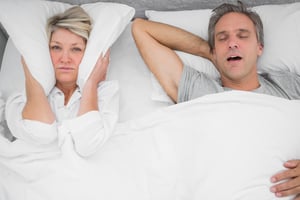 Snoring can be an aggravating and sometimes embarrassing condition. It can make getting a good night’s rest difficult for both the sufferer and anyone else who may sleep nearby. More importantly, however, snoring is often associated with a potentially serious sleep disorder known as obstructive sleep apnea (OSA).
Snoring can be an aggravating and sometimes embarrassing condition. It can make getting a good night’s rest difficult for both the sufferer and anyone else who may sleep nearby. More importantly, however, snoring is often associated with a potentially serious sleep disorder known as obstructive sleep apnea (OSA).
What is Obstructive Sleep Apnea?
There are multiple forms of sleep apnea, including obstructive, central, and a combination of the two known as complex sleep apnea. However, obstructive sleep apnea is the most common and recognizable form of the condition. In patients suffering from OSA, breathing is frequently interrupted during the course of sleep, as muscles at the back of the throat relax and the airway narrows. When this occurs, the body does not receive a sufficient amount of air and the blood oxygen level drops. In turn, the brain rouses the patient from sleep in order to breathe properly. This moment of wakefulness is often so brief that most do not realize it has happened. Still, with these instances occurring multiple times per hour, all night long, patients are unable to achieve the deep, restorative sleep needed to feel rested, function at their highest levels, and fight off illness.
Snoring as a Symptom of Sleep Apnea
As many as 90 million Americans snore, and while sleep apnea may be present in as many as half of these cases, snoring is not always indicative of OSA. Still, determining the cause of snoring is imperative to being able to sleep soundly and to rule out a potentially dangerous condition. Typically, snoring associated with OSA is loud and occurs with regularity. Sufferers may also wake in the middle of the night gasping for air, and observers may note that there appear to moments in which breathing stops. Additionally, those who snore and also suffer from sleep apnea may notice the following symptoms:
- Fatigue during the day
- Nighttime insomnia
- Dry mouth upon waking
- Headaches in the morning
- Irritability due to lack of sleep
Sleep Studies to Diagnose Sleep Apnea
In order to reach a definitive sleep apnea diagnosis, patients should undergo a sleep assessment at a sleep study center. During this assessment, known as nocturnal polysomnography, patients spend the night at the center where their sleep can be monitored by special equipment. These machines are able to record factors such as heart, brain, and lung activity, leg and arm movements, breathing patterns, and blood oxygen levels. Physicians are then able to interpret this data, provide a diagnosis, and recommend treatment options such as lifestyle changes or the use of a CPAP (continuous positive airway pressure) machine.
If you are a snorer and are concerned that it may be a symptom of sleep apnea, contact the Lane Sleep Study Center to request additional information and schedule your sleep study. When left untreated, sleep apnea can lead to more than daytime fatigue and has been associated with more serious health concerns such as high blood pressure, type 2 diabetes, and atrial fibrillation. Learning the source behind snoring earlier will not only improve the quality of your sleep, but the quality of your health as well.




